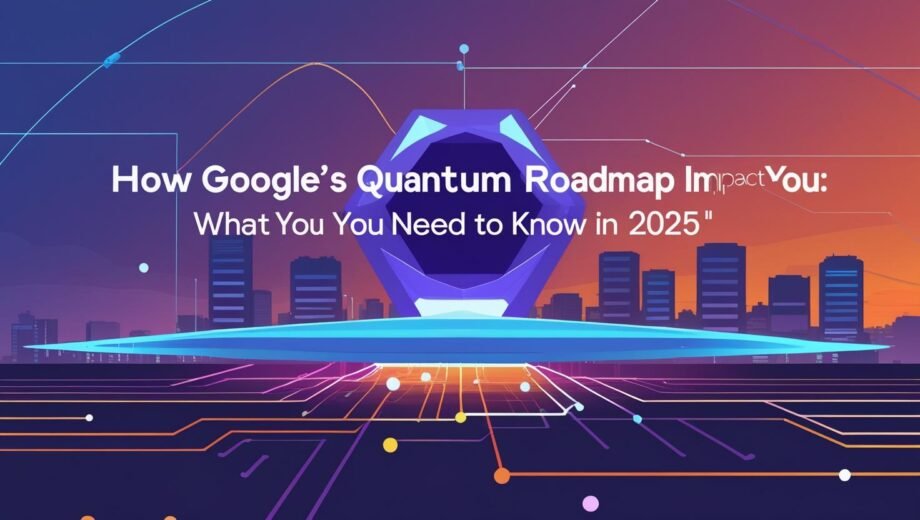Introduction
Have you ever wondered how the mysterious world of quantum computing might impact your daily life? Google Quantum isn’t just a futuristic experiment anymore—it’s a rapidly advancing technology with real-world applications already unfolding. With Google’s quantum computing roadmap 2025, the tech giant is leading a scientific revolution that promises to change how we solve problems in medicine, climate science, cryptography, and even artificial intelligence.
So, what’s Google planning in quantum, and how might it affect you, whether you’re in the US, Europe, or anywhere in between?
What is Google Quantum and Why It Matters?
Google Quantum refers to Google's initiatives in developing quantum computers capable of outperforming classical systems. Unlike traditional computers that use bits (0 or 1), quantum computers use qubits, which can represent both 0 and 1 simultaneously. This property, known as superposition, allows quantum machines to process complex problems much faster.
Quantum computing could revolutionize industries:
- Healthcare: by simulating molecules for drug discovery
- Finance: through optimization of investment strategies
- Security: via quantum-resistant cryptographic methods
And Google isn’t working alone. Its quantum labs have ties with universities, governments, and research centers across the US and Europe, making it a global project.

The Competitive Landscape in Quantum Computing
Google isn't the only player in the race to quantum supremacy. Companies like IBM, Microsoft, and Intel are also heavily invested in quantum computing. However, Google's edge lies in its custom-built processors and strategic partnerships.
In particular, Google's early declaration of achieving quantum supremacy with its Sycamore processor has helped it leap ahead in both perception and funding. Collaborative efforts with academic institutions give it a foundational strength in theory, while cloud-based applications position it for commercial readiness.
Understanding how Google compares to these competitors is important for businesses looking to adopt quantum solutions in the coming years.
Inside Google’s Quantum Computing Roadmap 2025
Google’s quantum computing roadmap 2025 outlines a structured approach to building fault-tolerant quantum machines. Here’s what’s coming:
- Improved Qubit Stability Google's current quantum chip, Sycamore, features 53 qubits. The next iterations aim to improve error correction, scalability, and coherence time.
- Logical Qubits Development By 2025, Google plans to build a logical qubit with low error rates. This would be a major step toward building practical quantum applications.
- Scalable Architecture Google is working on modular designs that could allow hundreds or thousands of qubits to function harmoniously.
- Cloud-Based Access Google plans to make these tools more accessible via its cloud services. Developers and researchers may soon be able to try Google Quantum AI from anywhere in the world.
- For a broader view on how major tech giants are planning for the future, check out our detailed breakdown of the Microsoft Azure Roadmap 2025–2030.
Qubits and Sycamore: Core Innovations Behind Google AI/Quantum
At the heart of Google’s system lies Sycamore, a quantum processor capable of performing tasks in 200 seconds that would take a supercomputer over 10,000 years.
Here’s how Sycamore works:
- Qubits: Made from superconducting circuits cooled to near absolute zero
- Entanglement: Allows qubits to be interconnected, enhancing computing power
- Quantum Supremacy: In 2019, Google claimed to achieve this milestone with Sycamore
Sycamore is not just a research project; it’s a stepping stone toward realizing Google's vision of quantum supremacy and beyond.
How This Technology Will Affect Daily Life in the US and Europe
Whether you live in California or Berlin, the ripple effects of quantum computing are set to be significant:
- Medical Research: Quantum simulations could help develop new treatments for cancer or genetic disorders.
- Traffic Optimization: Cities in the US and Europe could use quantum algorithms to reduce congestion.
- Climate Modeling: Google Quantum could help improve predictive models for weather and climate change.
- Cybersecurity: Stronger encryption models developed using quantum mechanics will enhance data privacy for consumers and institutions.
Governments across both regions are also funding quantum initiatives, aligning themselves with the pace Google is setting.
Quantum Computing and National Security
The implications of quantum computing extend into the domain of national security. Governments in the US and Europe are investing heavily in quantum-safe cryptography to future-proof sensitive communications. Google’s work aligns with these initiatives, as quantum computers could theoretically break today’s encryption methods.
In response, Google is researching post-quantum encryption algorithms, which are being tested in collaboration with agencies and cybersecurity experts. As more quantum breakthroughs occur, staying ahead of the security curve will be essential for both public and private sectors.
Try Google Quantum AI: Where and How
Curious minds can already try Google Quantum AI through its partnership with platforms like Cirq and TensorFlow Quantum.
Here’s how:
- Visit Google AI/Quantum page
- Explore their open-source tools
- Simulate small quantum circuits and algorithms on the cloud
Google is building a developer ecosystem now, so when the hardware matures, the world is ready.
You can explore the official tools and documentation on the Google Quantum AI official page.
Preparing for the Quantum Future: What You Can Do Now
While full-scale quantum computing is still emerging, now is the time to get informed. Whether you’re a developer, student, or business leader, consider exploring Google’s tutorials and open-source tools.
Follow updates from Google AI, enroll in online quantum computing courses, and keep an eye on breakthroughs in Google’s quantum computing roadmap 2025. Being proactive today means being prepared for a quantum-powered tomorrow.
FAQs
Q1: What’s Google planning in quantum?
Google is planning to scale up quantum processors, reduce error rates, and eventually offer cloud-based quantum services for enterprise and research use by 2025.
Q2: Is Google’s quantum computing better than IBM or others?
While IBM and others are also innovating, Google made headlines by achieving quantum supremacy in 2019. The competition remains fierce and beneficial for the entire field.
Q3: How can I access Google Quantum tools?
You can access some of Google’s quantum tools via open-source platforms like Cirq and TensorFlow Quantum, and through Google Cloud.
Conclusion
Google Quantum is no longer science fiction. With its eyes firmly set on 2025, Google is positioning itself at the forefront of a computing revolution. Whether through breakthroughs in qubits, the evolution of Sycamore, or new cloud tools, Google's quantum computing roadmap 2025 is something you should be paying attention to.
From the US to Europe, industries and governments are already preparing for what’s next. Are you ready to be part of the quantum future?








